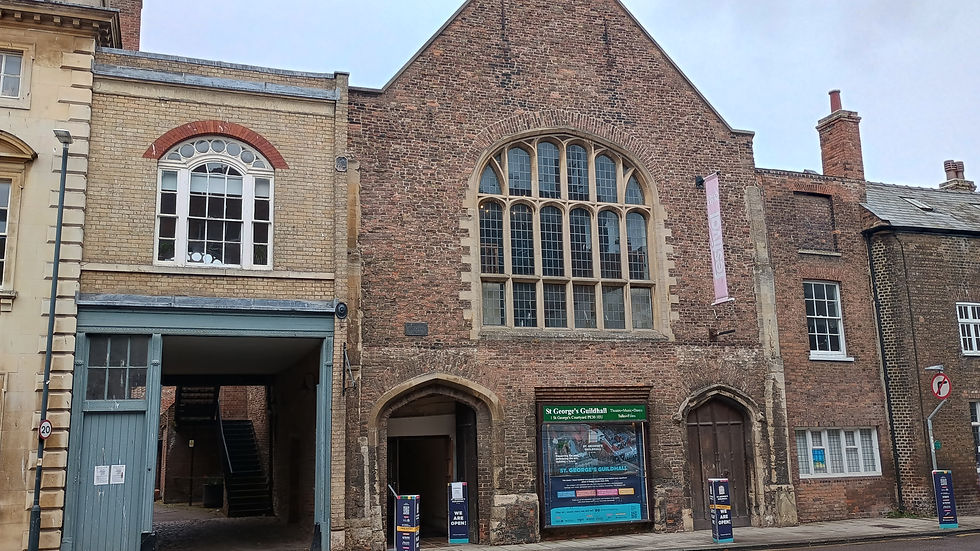Why We Voted Against Borrowing £16 Million More for the Guildhall Project
- Reform North West Norfolk

- Aug 1, 2025
- 4 min read

By the Reform Councillors – Borough Council of King’s Lynn & West Norfolk
As Reform councillors, we recently voted against the council’s proposal to borrow an additional £16 million for the Guildhall “Shakespeare Experience” project. A cultural regeneration scheme in King’s Lynn town centre now estimated to cost around £30 million in total.
We want to be very clear: we support investment in heritage and believe in the value of culture. But public money, especially borrowed public money, must be spent wisely, strategically, and in a way that delivers real benefit to the whole community, not just a select few. We also have a contractual and cultural responsibility to maintain this asset which is owned by the National Trust and is leased to the Council until 2050.
Here’s why we could not support this additional borrowing.
1. A £30M Project Without a Defined Product or Marketing Strategy
It has been openly stated by project leaders, even during the closing statement before the vote, that no marketing strategy is in the report because they haven't got the product.
This is a startling admission. In any regeneration or commercial initiative, marketing is not something you do at the end, it’s something you do at the beginning to help define the offer, understand your audiences, and ensure long-term sustainability.
Borrowing millions for a project without a clear commercial proposition is not regeneration it’s speculation.
2. No Clear Path to Economic or Social Return
King’s Lynn, like many market towns, faces real challenges, such as-
High levels of deprivation in some areas
Long-term unemployment
Youth disengagement
A lack of affordable, well-connected housing and services
The Guildhall project has been positioned as a tourism-led boost for the town centre. But there is currently no evidence that this cultural experience will deliver meaningful, measurable outcomes for the borough’s most disadvantaged communities.
In areas where poverty is entrenched, people need training, jobs, youth services, and access to opportunity, not a distant tourist attraction with expensive tickets and a narrow audience.
3. Missed Opportunity for Inclusive Regeneration
Heritage-led regeneration can be transformative, but only if it's planned alongside local people, with long-term social value baked into its foundations.
At present, there are:
No guarantees of local hiring or apprenticeships
No clear commitment to skills development in deprived wards
No transparent plan for how other outlying communities will benefit from the spend
Instead, the focus seems to be creating a flagship venue that may look impressive, but risks being culturally exclusive and commercially fragile.
4. Unsustainable Borrowing in a Time of Pressure
We are stewards of taxpayer money, and we have to look at the bigger picture.
The proposal to borrow an additional £16 million, bringing the project total to around £30 million, represents a major financial risk at a time when-
Local services are stretched
Inflation and construction costs are volatile
Public trust in spending decisions is under pressure
What We Support Instead
We are not against investing in our heritage or culture, we’re against doing so without a robust plan, without community benefit, and without financial clarity.
What we do support.
An initial smaller scale project that grows with demand, not guesswork
Local enterprise development that creates jobs for our residents
Investment in education, skills, housing, and health, where the return on investment is measurable and equitable
A town centre strategy that works in tandem with tackling deprivation across King’s Lynn, not separate from it
We want to be clear: we would have supported a staged approach to this project, starting with a modest initial phase focused on essential regeneration of the Guildhall itself, including crucial accessibility upgrades such as the installation of a lift. This would have allowed the venue to begin hosting performances, trialling the Shakespeare Experience, and generating audience feedback and early revenue.
With this proof of concept, the council could then assess demand, refine the offering, and, if successful, move forward with two further phases based on real-world performance and clear business data and revenue, rather than borrowing tens of millions up front on an unproven idea. This would have been a more responsible, inclusive, and commercially sound way to develop a cultural asset with long-term value.
The Shakespeare experience has often been referred to as the hook that attracts people to explore the broader culture and history of King's Lynn. The other aspects of the project in the buildings surrounding the Guildhall do not serve as the initial draw. If the hook succeeds and yields a return on investment, then the next phase can commence, potentially funded by the profits from the first stage.
We want better for King’s Lynn, regeneration that transforms lives, not just buildings.
Without a clear, defined product, a fully costed marketing and business plan, and a commitment to community inclusion, we cannot in good conscience support borrowing millions more of public money.
That’s why we voted no and we will continue to push for transparent, inclusive, and community-first regeneration that truly works for the people of West Norfolk.



